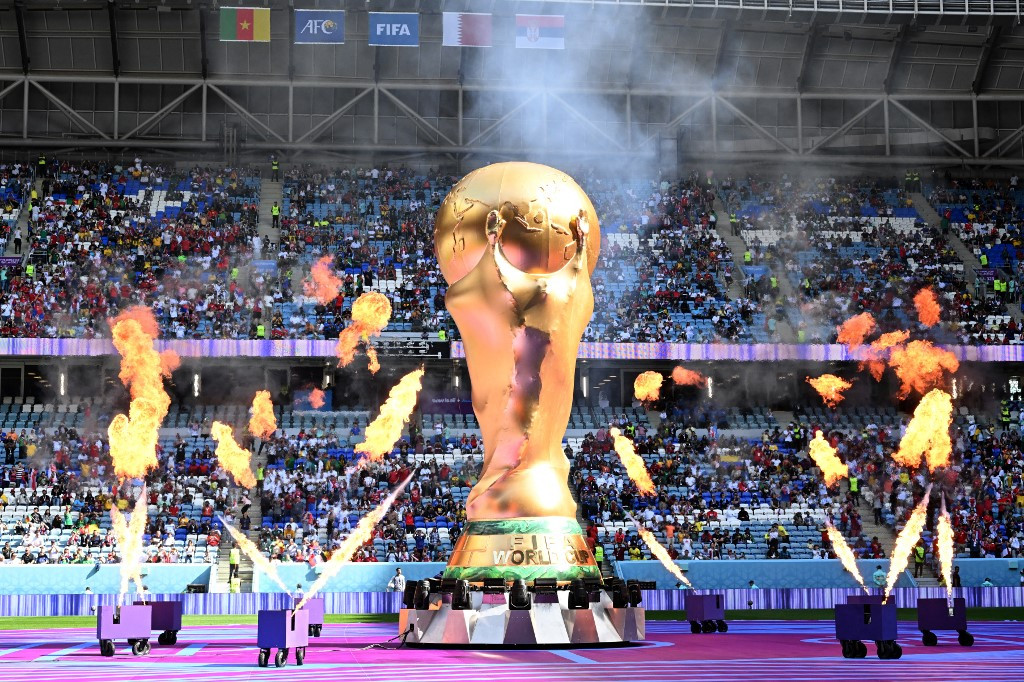Popular Reads
Top Results
Can't find what you're looking for?
View all search resultsPopular Reads
Top Results
Can't find what you're looking for?
View all search resultsFeeling alienated for not liking soccer? You’re not alone
Change text size
Gift Premium Articles
to Anyone
S
ome nonfans might feel like outcasts for not sharing soccer fans’ euphoria over the Qatar World Cup; others stay tuned just to keep up with the conversation, while still others simply don't care, one way or the other.
Soccer is one of the most popular sports in Indonesia, if not the most popular sport. At least 69 percent of the country’s 275 million-strong population, or almost 190 million Indonesians, loves the game. But not everyone is an avid fan.
The Jakarta Post talked to a few people who prefer to avoid the World Cup hype, even though the tournament is one of the most celebrated in the world.
Reluctant followers
Many people who aren’t fans of soccer are reluctantly following updates of the tournament, just so they can join the conversation or support their friends or family.
Bramantha Patra, a 24-year-old full stack developer in Bali, said that he has always preferred watching crime-thriller series or doing puzzles instead of sports.
“Some of my friends have called me ‘untypical’ for not loving soccer,” he said.
“My physical coordination is not that good. That’s why I’ve never been interested in anything related to sports,” the Bali native added. He had tried playing soccer or basketball to keep up with his peers, he continued, but he figured he was neither born to play sports nor had a passion for it.
In very general terms, soccer is still considered a male-oriented activity. In mainstream terms, the sport remains dominated by male superstars like Cristiano Ronaldo, Lionel Messi and Kylian Mbappé.
In the past few years, female players and women’s soccer have received growing recognition around the world, such as the United States’ women’s national team, which performed better than the US men’s team when it won the 2019 FIFA Women’s World Cup.
But as recently as this October, the world soccer governing body rejected some European broadcasters’ bids for the 2023 Women’s World Cup in Australia and New Zealand for amounting to “roughly 2 percent” of rights deals to broadcast the men’s event, according to Bloomberg.
Meanwhile, non-soccer fans are sometimes labeled as not being masculine enough.
In order to keep up with some of his friends, Bramantha said, he felt he needed to put on a mask, pretending as if he understood the sport. He would also check trending topics on Twitter to see who the highest-rated players were at Qatar.
Aside from Twitter, other social media platforms like Instagram have been a major source for both fans and nonfans to get the latest World Cup updates.
“I had to force myself to look up [World Cup] news to be able to connect with my peers,” said Bramantha. Though he didn’t have a fear of missing out, informally referred to as FOMO, he could understand that some non-soccer fans felt like social outcasts.
“It’s a normal psychological reaction for individuals to feel that way. But we can choose how to respond when individuals call us out for not following a trend,” he emphasized.
Not being a soccer fan doesn’t necessarily mean eschewing all sports.
Mutiara Nasution, a 36-year-old freelance illustrator and mother of two, is an avid fan of Formula 1 and baseball. But like Bramantha, she constantly keeps up with World Cup updates via social media.
Mutiara said she didn’t follow the tournament mainly because she didn’t understand how the game was played, though she added that soccer’s quadrennial tournament was different from any other major sports event.
Indonesians’ general enthusiasm for the World Cup is partly due to the large gatherings known as nonton bareng (watch together), or nobar, which have become somewhat of a local custom.
For Mutiara, the nobar events allowed her to meet up with friends and become closer to her father. She also has her own way of keeping up with the World Cup.
“I just follow [whichever team] does better. For example, in the last match between Japan and Germany, I supported Japan, because the players scored such a wonderful goal,” she said.
“I don’t have a favorite [team],” she added, and though she wasn’t an avid soccer fan, she didn’t suffer from FOMO because she had a busy daily schedule.
From the global perspective, FIFA said the 2018 World Cup had over 3.57 billion viewers worldwide, the highest viewership in the tournament’s history. According to FIFA president Gianni Infantino, the World Cup Qatar 2022 was expected to pull in 5 billion viewers.
That’s over 60 percent of the world’s population of around 8 billion people.
Not interested
While some non-soccer fans follow certain news about the tournament, others prefer to avoid the hype.
Afifah Hanun, a 25-year-old private employee in Bali, said she didn’t care much about not following the game, primarily because her family wasn’t keen about sports news. Instead, most members of her family viewed sports as an activity, and not an entertainment program to binge-watch on a Saturday night.
“Though I’m not a fan, I’m not saying watching soccer is a bad thing. Because at the end of the day, when you get bored or burned out, you need something refreshing right?” she said.
Nonfan, no problem: Afifah Hanun, who works in Bali, is a non-soccer fan who says she doesn’t care about following the trend, mostly because her family looks at sports as a physical activity, not entertainment. (Courtesy of Afifah Hanun) (Courtesy of Afifah Hanun/.)For Amadeus, who asked to be identified only by his nickname, soccer just isn’t his cup of tea.
The 36-year-old information technology (IT) tutor in Malang, East Java, said he was more interested in IT news and stock updates. He also didn’t find soccer interesting, as he didn’t play the sport, and he didn’t find watching the game enjoyable, either.
Amadeus added that he preferred to do other activities, such as monitoring the stock market or playing video games, instead of spending 90-120 minutes watching a soccer game.
“At the end of the day, there will be groups who will have interests similar to ours, so you don’t really have to follow certain hype just to feel like you belong,” he said.
Is FOMO normal?
While some nonfans completely avoid soccer and don’t care what people think, others may experience FOMO. But is feeling this way normal?
Daniar Dhara Fainsya, a clinical psychologist and mother of one, said it was normal for individuals to feel left behind for not following a trend.
Citing A Theory of Human Motivation by US psychologist Abraham Maslow, Daniar said that basic human needs included physiological fulfillment and a sense of security that an individual could fulfill on their own. However, human beings also had other needs that required others to fulfill.
‘No man is an island’: Clinical psychologist Daniar Dhara Fainsya says it is normal for non-soccer fans to feel left out when their friends are discussing the World Cup, but that this should not lead to negativity about who they are. (Courtesy of Daniar Dhara Fainsya) (Courtesy of Daniar Dhara Fainsya/.)It was therefore normal for a person to feel lonely or that they didn’t relate to their peers while discussing a big event such as the World Cup. But Daniar emphasized that such individuals needed to watch their behavior carefully to avoid negative thoughts.
“If someone feels later that they no longer have any friends to talk to because they don’t follow the trend, this would be slightly concerning,” she said.
So what should people do if they feel lonely or left out?
Daniar said that first, such people needed to stop comparing themselves to others, pointing out that there were many other topics they were interested in that they could talk about.
For example, people who weren’t interested in sports could “connect with other people who might have similar hobbies [...] so “you won’t feel you’re alone”.
Social media also offered wider interactions with a large number of people, which might increase social comparison. In such cases, social media detox could be the best solution, she said.
“However, if you keep feeling that you are ‘not good enough’, I suggest you to seek professional help,” Daniar added.
“You need to remember that every individual has their own preferences, and that every single person is unique.












